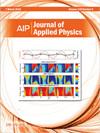利用斯通里波对粘接界面进行超声波表征
IF 2.5
3区 物理与天体物理
Q2 PHYSICS, APPLIED
引用次数: 0
摘要
提出了一种利用 Stoneley 波评估粘接界面特性的超声波无损方法。首先,建立了一个理论模型。在该模型中,分析了石英-钢界面上 Stoneley 波的频散关系以及脉冲产生的瞬态信号。在不同的弱结合条件下,斯通里波的频散特性存在显著差异。为证实理论预测,进行了激光超声波实验,通过粘合固化时间模拟不同的界面强度。在这些结果的基础上,采用反演方法,利用光谱分析方法提取的不同石英-钢结合界面上相应的 Stoneley 波频散特性,重建界面刚度。结果显示出与理论预测相似的趋势。最后,利用重建的界面刚度计算了不同粘接固化时间下界面波的瞬态波形,结果与实验结果显示出良好的一致性,从而验证了反演结果的合理性。本文章由计算机程序翻译,如有差异,请以英文原文为准。
Ultrasonic characterization of bonding interfaces using Stoneley waves
An ultrasonic nondestructive method for evaluating bonding interface properties using Stoneley waves was proposed. First, a theoretical model was established. In this model, the dispersion relationship of the Stoneley wave at the quartz–steel interface and the transient signals generated by a pulse were analyzed. Significant differences were observed in the dispersion characteristics of Stoneley waves under different weak bonding conditions. Laser ultrasonic experiments were conducted to confirm the theoretical predictions, in which different interfacial strengths were simulated through the bonding–curing times. Based on these results, the inversion method was implemented to reconstruct the interfacial stiffness by using the corresponding dispersion of the Stoneley wave at different quartz–steel bonding interfaces extracted by the spectral analysis method. The results showed a similar tendency to those shown by theoretical predictions. Finally, the reconstructed interfacial stiffnesses were used to calculate the transient waveforms of the interface waves at different bonding–curing times, and the results showed good consistency with the experimental results, thereby verifying the rationality of the inversion results.
求助全文
通过发布文献求助,成功后即可免费获取论文全文。
去求助
来源期刊

Journal of Applied Physics
物理-物理:应用
CiteScore
5.40
自引率
9.40%
发文量
1534
审稿时长
2.3 months
期刊介绍:
The Journal of Applied Physics (JAP) is an influential international journal publishing significant new experimental and theoretical results of applied physics research.
Topics covered in JAP are diverse and reflect the most current applied physics research, including:
Dielectrics, ferroelectrics, and multiferroics-
Electrical discharges, plasmas, and plasma-surface interactions-
Emerging, interdisciplinary, and other fields of applied physics-
Magnetism, spintronics, and superconductivity-
Organic-Inorganic systems, including organic electronics-
Photonics, plasmonics, photovoltaics, lasers, optical materials, and phenomena-
Physics of devices and sensors-
Physics of materials, including electrical, thermal, mechanical and other properties-
Physics of matter under extreme conditions-
Physics of nanoscale and low-dimensional systems, including atomic and quantum phenomena-
Physics of semiconductors-
Soft matter, fluids, and biophysics-
Thin films, interfaces, and surfaces
 求助内容:
求助内容: 应助结果提醒方式:
应助结果提醒方式:


